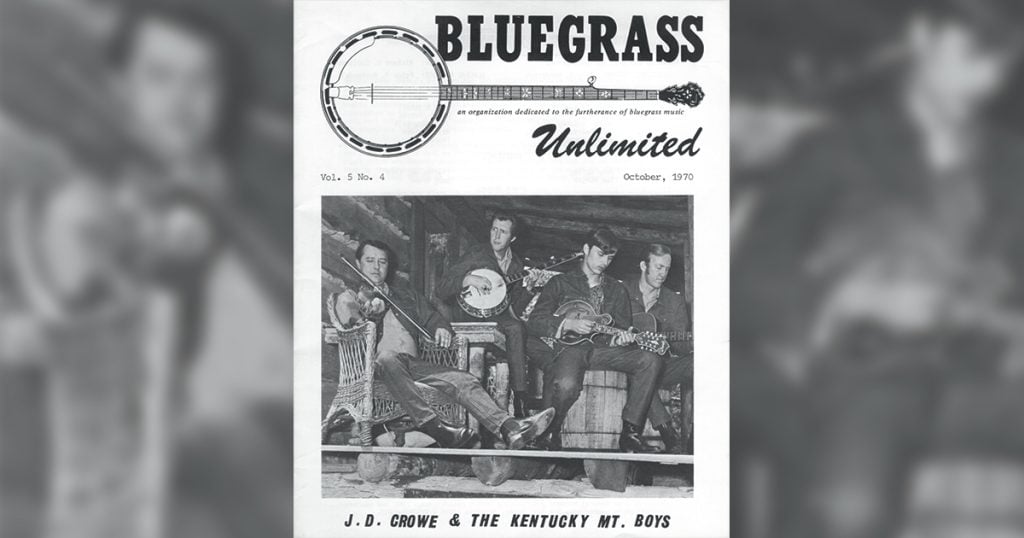Home > Articles > The Archives > Breakthrough In Bluegrass Repertoire
Breakthrough In Bluegrass Repertoire
Reprinted from Bluegrass Unlimited Magazine
October 1970, Volume 5, Number 4
Having never seen J. D. Crowe and the Kentucky Mountain Boys in person, I was looking forward to their appearance at Carlton Haney’s Labor Day Weekend Festival. When they mounted the stage, I was not disappointed. In addition to their considerable instrumental and vocal abilities, their selection of material made a great impression on me. J. D. and the boys have obviously been listening to some of the excellent material in the “country-rock” vein and have adopted several numbers to the bluegrass idiom with stunning success.
n and have adopted several numbers to the bluegrass idiom with stunning success.
(Many BU readers will already be familiar with certain albums released in the past few years by groups such as the Byrds, the Flying Burrito Brothers, and Dillard & Clark which are country-oriented. Those of you who are not may be turned on to them by the Kentucky Mountain Boys—just as many of the electric groups’ hip audience have been turned on to country and bluegrass bands by the Byrds and Burritos.)
In their opening set alone, J.D. & Co. treated us to hair-raising trio versions of three Burrito compositions: “Sin City,” “Christine’s Tune” (“She’s A Devil in Disguise”), and “God’s Own Singer.” Great! They left me with the impression that: (1) they have a lot more of these goodies up their collective sleeve to spring on us in the future, and (2) any song they chose to adapt would be handled with the same tastefulness as the ones mentioned above.
As the first country bluegrass group to delve into this rich lode of material, J. D. Crowe and the Kentucky Mountain Boys have made a breakthrough in bluegrass repertoire of a significance comparable, I believe, to that made in the rock field around 1964 when the Byrds first performed and recorded “Mister Tambourine Man” and other material from the pen of Bob Dylan.
Self-composed material is not a bluegrass band’s only answer to the problem of variety in repertoire—although Crowe’s group may have some original stuff (nothing these guys might do would surprise me)—when an intelligent choice can be made from contemporary songs and oldies in other fields. Among the numbers that would lend themselves admirably to bluegrass arrangements, certain titles such as Hickory Wind; Hello Mary Lou, Goodbye Heart; Country Honk; Highway Man; Pickin’ Up the Pieces; Honky Tonk Man; Pretty Boy Floyd; and Your Gentle Way of Loving Me, come to mind.
Speaking as a Monrovian traditionalist of the hardest core, I should point out to those who have not experienced the Kentucky Mountain Boys in person, that these fellows can (and do) belt out mainline grass with the greatest of ’em. Several of the “younger” groups with an eye to the future health and well-being of the music are experimenting with ideas that will enable them to sell bluegrass to a new audience. After seeing Crowe, I would say that he is moving in the right direction: a tasteful (and unplugged) blend of traditional and contemporary songs, shying away from controversial political content (lest bluegrass betray its very positive role as a unifying force capable of bridging gaps: young-old, city-country, hip-straight).
By contrast, I would say that the Osborne Brothers (for all their good intentions, bless ‘em) are going in the wrong direction: amplification and drums, material of limited depth and scope, overemphasis on Haggardesque political harangues. Sonny and Bob are looking for it (which is something, some groups haven’t even started to look), but J. D. has found it.
The one thing that might enhance the Kentucky Mountain Boys’ sound is the addition of a fiddle—as indicated on one set when Art Stamper joined in as a very welcome guest artist. Even if the logistics of adding a man might not prove workable on the road, I’m sure Byron Berline could be persuaded to lend a hand on their recording sessions. But I seem to have digressed.
Crowe’s band has had network television exposure. When some of their current repertoire is released on disc, I look forward to hearing it on my local underground FM radio station (I’m certain it would be well received in that context). In any event, I propose a toast to the spirit of innovation which refuses to compromise on quality. And I would also wish J.D.’s band the best of luck … if they needed it.

